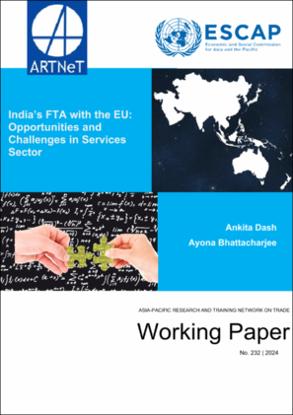India’s FTA with the EU: opportunities and challenges in services sector

Trade in services has been of special interest to both India and the EU as services are a major contributor to GDP and trade flows in the two economies. Steadily rising services trade between India and the EU is, however, characterized by certain peculiarities, which are worth noticing. These include differences across sub-sectors, trading partners, modes of trade and regulatory barriers. These make it worth exploring the potential costs and benefits of increasing trade flows through trade agreements even further while also diversifying the sub-sectors and the destination countries. This is highly relevant as after a gap of nine years, in 2022, India and the EU have recently relaunched talks for an all-inclusive free trade agreement (FTA) in 2022, to cater to their common interests concerning trade in services.
Against this background, this study uses both quantitative and qualitative approach to explore the opportunities and challenges for India under a probably India-EU FTA. Using disaggregated data over 2010-2021, we construct different trade indicators, to identify these potential markets and services, prospects of which can be further explored in the India-EU FTA. Legal text analysis of analogous FTAs that EU and India have signed with developing and developed partners respectively was also undertaken to better understand the style to the negotiations, language of legal texts and commissions/restrictions offered by these countries to their respective partners.
The analysis discovers the services sectors in which India has strategic export interest in the EU region, namely, Technical and Trade related services, Research and Development related services and Transport services. The major sectors which need careful negotiations such that India can improve its services balance and put to good use its bilateral RCA are Computer and Information services, Professional and Management services and Travel. Charges for use of intellectual property, Telecommunication and Insurance and Pension services could be other areas for consideration which at present do not experience significant esports from India to the EU but have the potential for significant gains under a liberalized regime.
The broad scope of this study is to analyze the opportunities and challenges for India’s services industry under an FTA between India and the EU and provide suggestions for India’s negotiation approach.
